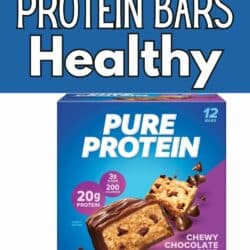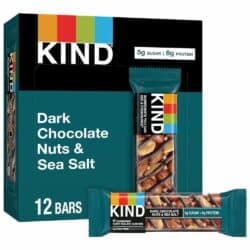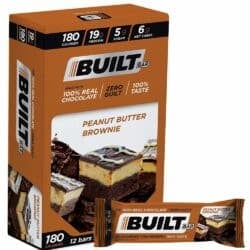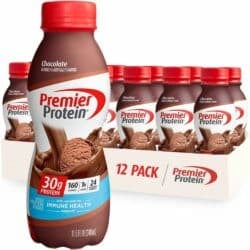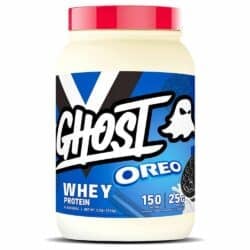Are Pure Protein Bars Healthy (From a Nutritionist)?
In this blog post, I’ll review the question of whether Pure Protein Bars are healthy or not. Find out this product’s nutrition pros and cons and some better options for high-protein snacks that are convenient and easy. In my opinion as a nutritionist, Pure Protein Bars are not a healthy snack due to the highly processed ingredients.
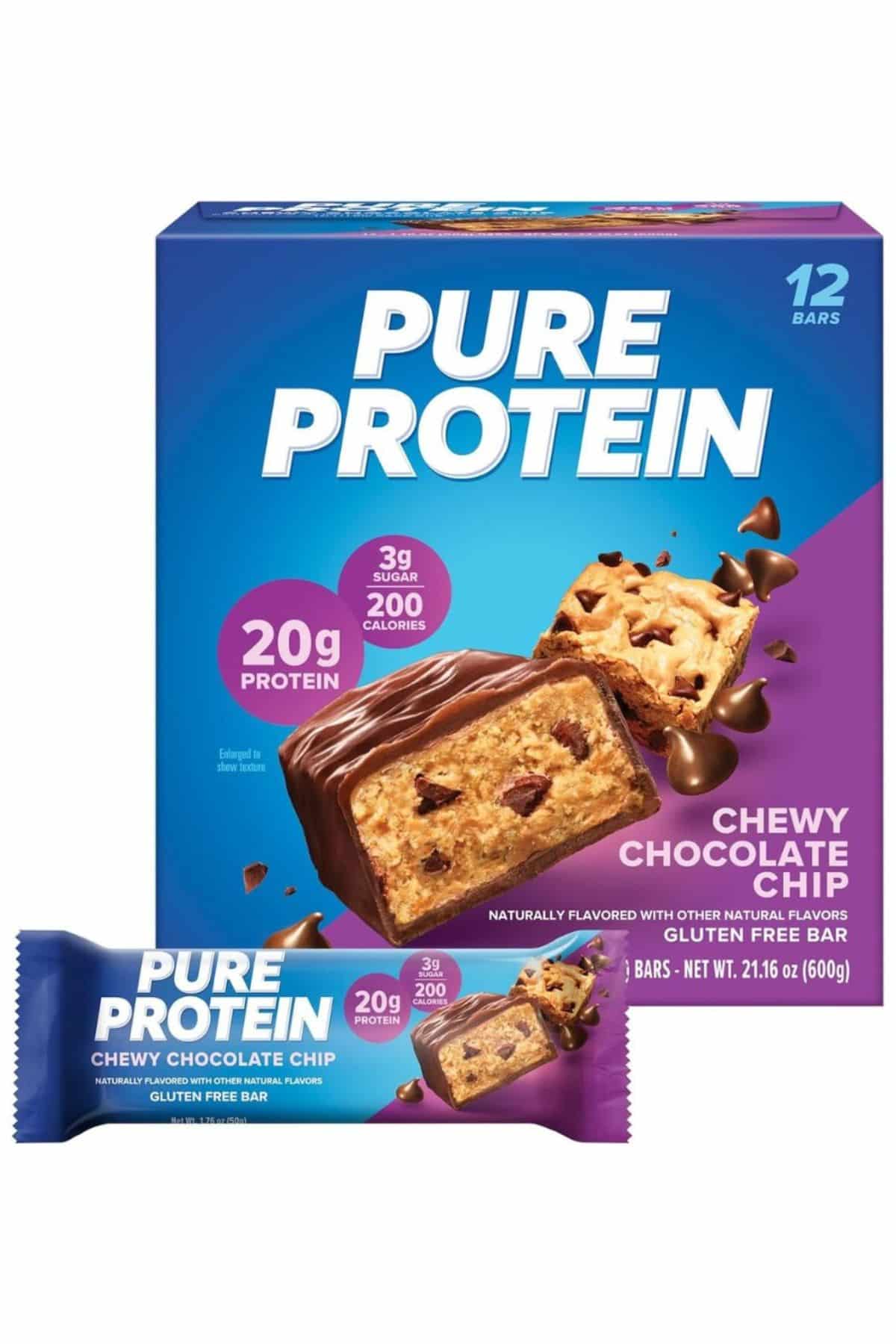
Pure Protein Bar Facts
Pure Protein Bars are low-calorie, gluten-free, low-fat protein bars that are also low in sugar. These bars and other protein products are a subsidiary of 1440 Foods, a sports and active nutrition company founded in 1993.
Pure Protein bars were created to be a protein snack for fitness enthusiasts. The brand is marketed as a flavorful, high-protein lifestyle snack that is low in sugar. On average, each bar has about 20 grams of protein each with only a few grams of sugar.
Pure Protein bars are available online in boxes containing four bars and as 9-packs with nine boxes of four bars each.
They come in several flavors, including Galactic Brownie, Caramel Churro, Chocolate Peanut Butter, Chocolate Deluxe, Chocolate Salted Caramel, Cookies And Cream, Chewy Chocolate Chip, Lemon Cake, Chocolate Mint Cookie, Birthday Cake, Peanut Butter Dark and Chocolate Nut Bar. Pure Protein also sells bite-sized versions of bars, along with snacks, shakes, and powders.
The different flavors of Pure Protein bars contain a variety of ingredients.
Some flavors contain nuts and milk products. Most bars contain soy protein isolate, whey protein isolate, sugar, soy lecithin, tapioca starch, cocoa, maltodextrin, defatted peanut flour, and natural and artificial flavors.
Pure Protein Bars Ingredients
Let’s look at some of the main ingredients in Pure Protein Bars and what they main mean for your health.

The ingredients in the Chocolate Chip flavor include:
- Protein Blend (Soy Protein Isolate, Whey Protein Concentrate, Whey Protein Isolate, Milk Protein Isolate)
- Hydrolyzed Collagen
- Glycerine
- Maltitol Syrup
- Water
- Maltodextrin
- Maltitol
- Fractionated Palm Kernel Oil
- Sugar
- Whey Protein Concentrate
- Canola Oil
- Natural Flavors
- Milk
- Chocolate Liquor
- Cocoa Butter
- Tapioca Starch
- Cocoa (Processed with Alkali)
- Calcium Carbonate
- Soy Lecithin
- Cocoa
- Butterfat
- Xanthan Gum
- Salt
- Partially Defatted Peanut Flour
- Sucralose
- Almond Butter
- Tocopherols (Added to Protect Flavor)
Fractionated Palm and Palm Kernel Oil and Canola Oil
Pure Protein Bars contain industrial seed oils like canola and palm kernel.
According to scientific research, seed oils can cause various health problems, including atherosclerosis, oxidative stress, and cardiovascular disease. These oils may also cause chronic inflammation in the body.
Most seed oils, especially canola oil, are genetically modified, in addition to being highly processed and usually hydrogenated. Hydrogenation causes an increase in trans fats, which may raise LDL cholesterol levels – the bad kind of cholesterol.
Read my related review of Quest Protein Chips.
Protein
Pure Protein bars contain a protein blend of various proteins, including milk protein concentrate, soy protein isolate, whey protein isolate, and whey protein concentrate.
Let’s look at some of these protein ingredients in greater detail.
Milk Protein Concentrate (MPC)
Milk protein concentrate (also known as milk protein isolate) is a dairy product that contains a high protein content. Since it contains lactose, it can cause digestive issues in people who are allergic to lactose or sensitive to dairy products.
Dairy products, especially non-organic and processed dairy products, can also contain pesticides, chemicals, and hormones that can adversely affect a person’s health.
If you consume dairy, it is likely best only to have certified organic, hormone-free dairy from grass-fed cows.
Soy Protein Isolate (SPI)
Soy protein isolate (SPI) is a highly processed protein derived from soybeans.
Although it’s a protein-dense plant-based ingredient, there are a few health considerations to remember. Most soy contains phytoestrogens and is genetically modified, which can significantly affect hormone levels.
Furthermore, soy can alter thyroid function in people with an iodine deficiency, causing digestive issues. If you’re pregnant, have health problems, or are unsure about soy, read my blog about the potential dangers of eating soy and also speak to your healthcare provider for more information.
Milk Protein Concentrate (MPC) and Calcium Caseinate
Milk protein concentrates (MPC) and calcium caseinate are dried protein powders made from skim milk. These protein powders undergo heavy mechanical or chemical processing. Calcium caseinate is derived from the casein in milk.
Compared to other dairy products, these ingredients contain less lactose, but they may still not be suitable for someone with a lactose or dairy intolerance.
These products are also not suitable for someone following a plant-based diet. These proteins also cause digestive issues in some people, such as bloating, gas, cramps, and nausea.
Whey Protein Isolate
Whey protein isolate and concentrate is a highly processed protein source.
Manufacturers make whey protein by removing the non-protein components from the milk to create a high-protein product. Whey protein concentrate contains less protein and more carbohydrates and fat than whey protein isolate.
Besides the potential for allergies and side effects, studies have linked whey to adverse effects on kidney and liver function.
Partially Defatted Peanut Flour
Partially defatted peanut flour may be considered a healthy alternative to other flour products.
However, defatted products undergo a process that removes some of their nutritional value.
It is also worth noting that people with allergies or sensitivities to nuts must avoid any products containing tree nut ingredients, including partially defatted peanut flour.
Hydrolyzed Gelatin
Gelatin is one of the potentially healthier ingredients in Pure Protein Bars.
It’s a naturally occurring protein derived from collagen. Animals have this protein in their bones, skin, and cartilage. It’s an essential ingredient for healthy joints. Gelatin is an additive in food like desserts, sauces, medications, and candies. It is suitable for a gluten-free diet but not a vegan one because it is an animal by-product.
Gelatin contains many health benefits. It can help boost collagen levels in the skin, improving elasticity. Gelatin can also help improve digestion, provide a better night’s sleep, and assist in weight loss. It also contains lysine, which is excellent for bone health.
Maltitol Syrup
Pure Protein Bars contain maltitol, a sugar alcohol made from corn that is a highly processed ingredient and can cause potential health risks.
Research has revealed that this sugar alcohol can increase appetite and potentially cause obesity. Studies have also shown that maltitol contributes to diabetes, inflammation, and non-alcoholic fatty liver disease.
Additional Ingredients
Additional ingredients in these bars include almond butter, calcium carbonate, xantham gum, fractionated palm kernel oil, natural flavors, and others. Be sure to read the ingredient label of any bar you purchase.
Nutrition Pros
Pure Protein Bars contain protein, which can help keep you feeling full longer without needing to snack as often.
These bars are also a low-calorie option for people who want a high-protein food with fewer calories.
Nutrition Cons
Pure Protein Bars are highly processed and contain dairy, soy, and nuts, three of the most common allergens. Some flavors contain all three, while others may contain one or two. These bars will be unsuitable for anyone allergic to these ingredients.
Although these bars are listed as having a low amount of sugar, some flavor variants are sweetened with added sugar, maltitol, or corn syrup, while others contain all three sweeteners. These highly processed sugars and sugar alcohols may contribute to health problems such as diabetes, inflammation, and obesity.
Instead of purchasing a highly processed product like Pure Protein Bars, consider making your own healthier and less expensive version with real food ingredients at home.
Or, choose from other easy high-protein snacks including sugar-free jerky, cottage cheese, nuts or seeds, or a homemade protein smoothie made with quality ingredients (even a product like Orgain Protein Powder might be healthier).
I do not consider Pure Protein Bars to be an adequate meal replacement food or even a decent post-workout snack as they are low in micronutrients and aren’t made from whole foods.
Pure Protein Nutrition FAQs
Although their website says their bars are labeled gluten-free, it doesn’t list them as certified gluten-free.
No, they are likely not. Pure Protein Bars are highly processed snacks made in a factory and contain corn syrup and sugar, so they are probably unsuitable for people with diabetes. Speak to your doctor for other options.
Most Pure Protein Bars are sweetened with either sugar, maltitol, or corn syrup. Pure Protein bars contain all three types of sweeteners in some flavor variations.
More Snack Reviews You Might Like!
Conclusions
Pure Protein Bars may be a slightly better option than other protein bar brands because they are gluten-free and low in calories, but they are not an ideal snack for health-conscious people. These bars contain various highly processed ingredients and can’t be considered part of a clean eating lifestyle.
Don’t forget to join my newsletter list to get exclusive clean eating recipes and tips. The newsletter is 100% free with no spam; unsubscribe anytime.
About the Author: Carrie Forrest has a master’s degree in public health with a specialty in nutrition and is a certified holistic nutritionist. She is a top wellness and food blogger with over 5 million annual visitors to her site. Carrie has an incredible story of recovery from chronic illness and is passionate about helping other women transform their health. Send her a message through her contact form.
Note: this post is for informational purposes only and is not intended as medical advice. Please consult your healthcare provider for recommendations related to your individual situation.


